The Dillinger Escape Plan, Terminal 5, gig review: Immensely influential hardcore luminaries bow out in spectacular style
The curtain comes down on one of the most unique propositions in heavy music over three nights in the Big Apple
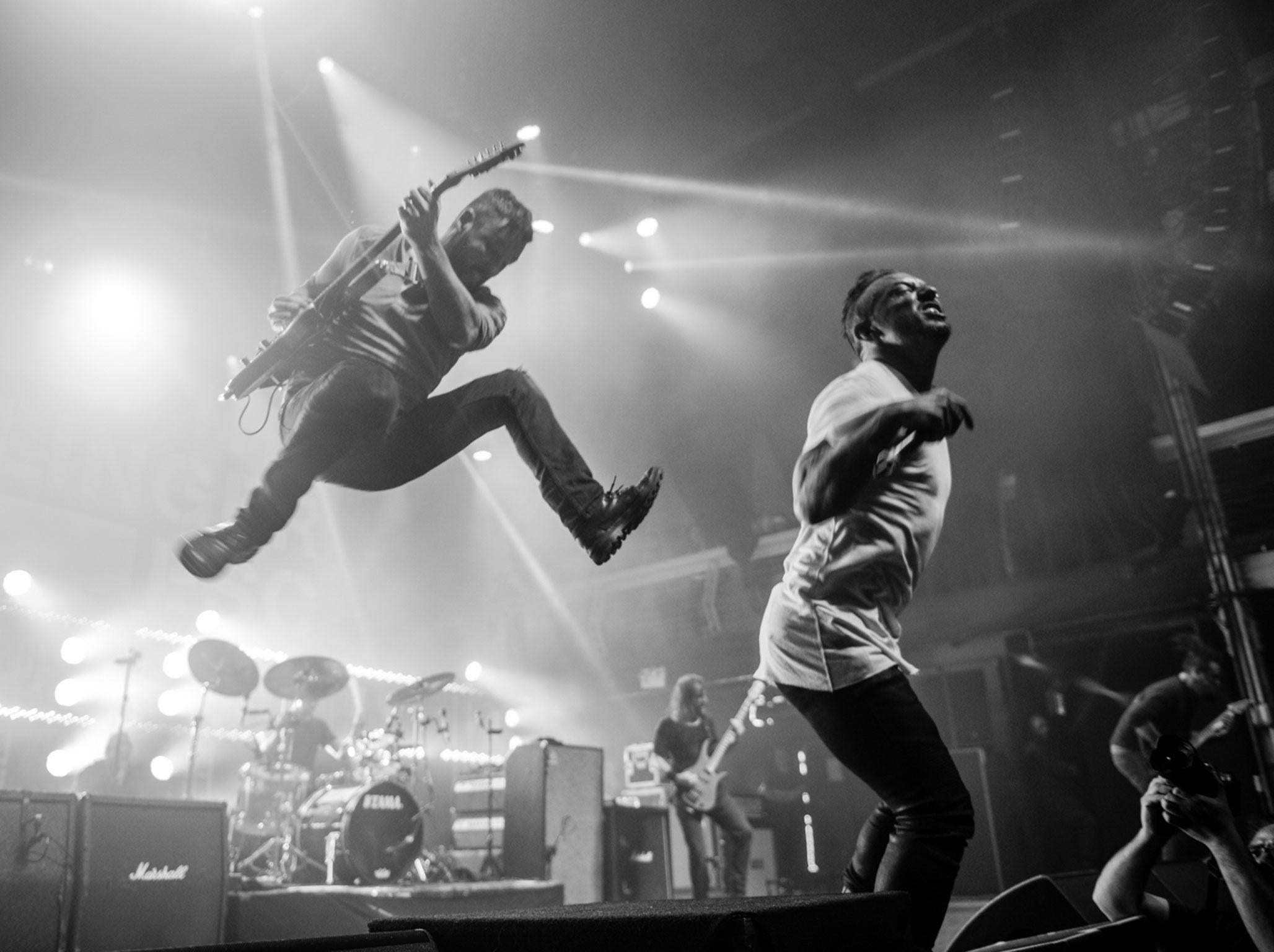
It’s been a torturously slow 16 months; in August 2016, the death knell began to toll for one of the most unique, influential bands in the history of heavy music. New Jersey’s The Dillinger Escape Plan announced that their sixth album, Dissociation, would be their last and the subsequent tour would be the final chance people would have to see one of the most incendiary live bands in modern music decimate venues across the globe. In their 20 years as a band, The Dillinger Escape Plan created and evolved a radical new sound that drew on far more than the small circle of influences that the majority of their contemporaries had picked up on, broadening its reach to include elements of EDM, jazz and industrial before consuming them and feeding them through a distinctly Dillinger-esque filter.
Scan forums and Facebook groups and you’ll find a plethora of apathetic comments arguing that this isn’t really the end and that surely this split is merely a momentary hiatus. In a world where “the retirement tour” is a legitimate strategy for reinvigorating the life span of a veteran band, it’s easy to see where this cynicism emanates from. However, there is such finality to proceedings over the three nights at New York’s Terminal 5 that it would feel such a waste if the cynics were correct. This residency provides the most perfect closure for such an enigmatic, one-of-a-kind band. If you’re still in doubt however, know this; Dillinger were a band of ferocious integrity, never having to bow down to commercial pressure or compromise on their art. They’ve not once shied away from the truth and if they say this is the end, one is inclined to believe that it really is. Even before Dillinger step on to the stage, there is a perceptible crackle of finality in the air tonight.
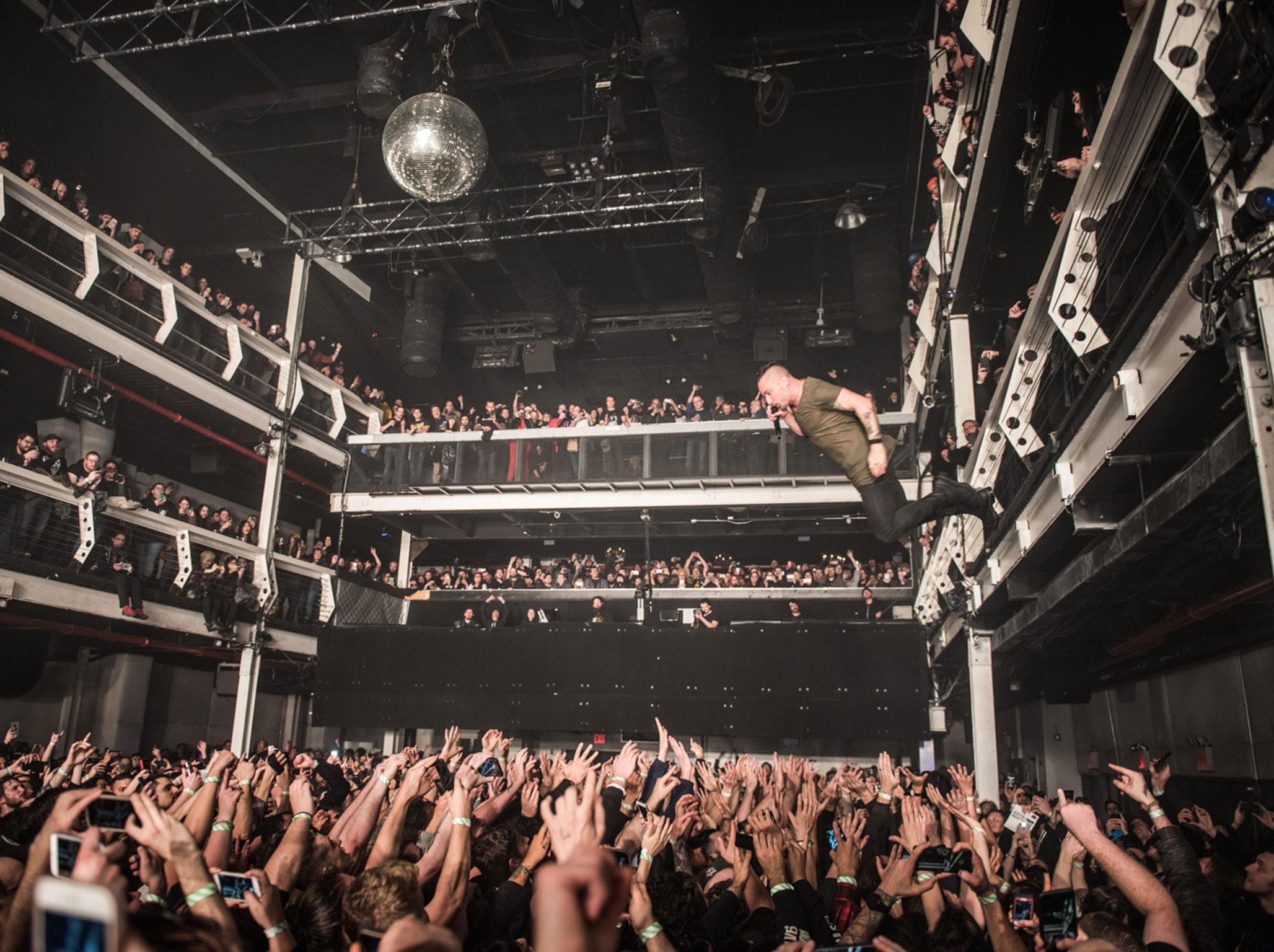
As you would expect, Dillinger have plenty of treats up their collective sleeve for these final three shows, including an opening slot on night one by Stockholm’s God Mother. Their album Viseledd, recently released by Dillinger guitarist Ben Weinman on his Party Smasher label, is one of the most underrated heavy releases of the year, melding sludgy tones and death-metal blast beats with aggressive, fast-paced hardcore. It’s an intoxicating combination, made all the more potent by the captivating performance of vocalist Sebastian Campbell, a wild Tasmanian Devil of activity that flails around whilst screeching into the microphone. Whether onstage or off, he’s a beguiling presence but the band behind him (or sometimes in front of him) are more than capable of providing the soundtrack to such a cataclysmic performance. There are enough eccentricities and quick turns of pace in their music to mark them out as ones to watch.
Rather than bring in a second support act for night one, Dillinger call on the services of Faith No More, Mr. Bungle and Tomahawk (as well as a number of other projects) vocalist Mike Patton to lend his considerable talents to a performance of their 2002 collaborative EP Irony is a Dead Scene. It’s just one of a number of examples of events that Dillinger have planned to make these three nights even more special for the faithful who’ve travelled from all over the world to be here tonight.
Dressed in civvies, bespectacled and hunched over a box of tricks that manipulates his voice into all sorts of strange, beastly iterations, Mike Patton doesn’t cut the absolutely legendary figure you’d expect from one of the most gifted, versatile frontmen of his generation. His work alongside Dillinger can easily be considered some of the most creative, ingenious output the band ever committed to tape but it’s rare that these songs are performed live, so it’s an especial treat to see them with Patton on the mic.
“Pig Latin” is just sheer lunacy and sounds as gloriously psychotic as it did upon its release 15 years ago, whilst “When Good Dogs Do Bad Things” is possibly Dillinger at their most idiosyncratic. Their cover of Aphex Twin’s “Come To Daddy” is just as sinister and creepy as one would expect but this set is crowned off perfectly with a deliciously unexpected cover of Faith No More’s “Malpractice”, a perfect choice for some Dillinger-esque manipulation. It’s a largely straight cover and the song’s militarised beat is in stark contrast to the frenetic rhythms usually spat out by the band, but this somehow lends the precise beats all the more power.
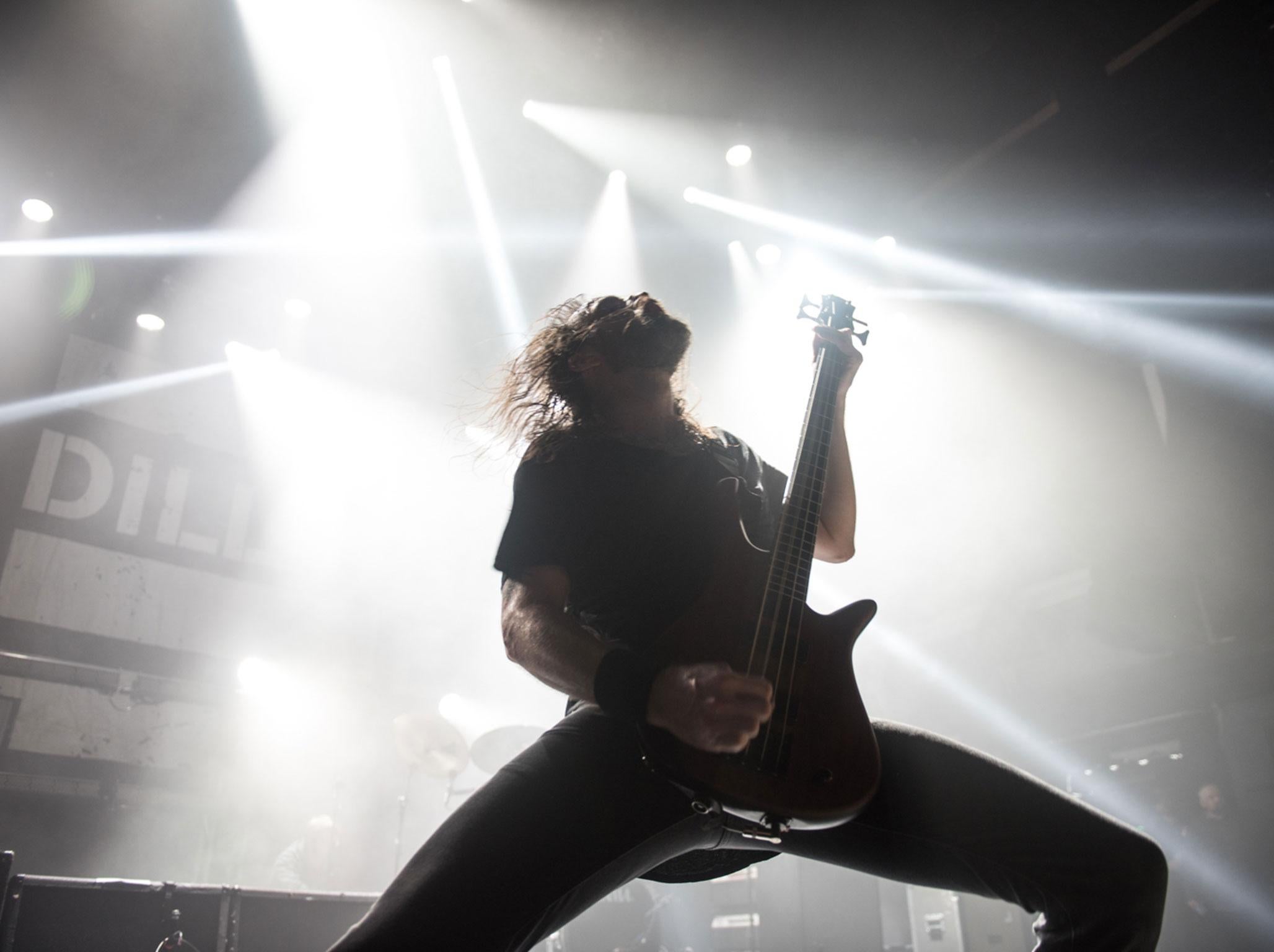
For nights two and three, Rhode Island’s Daughters open up proceedings and it’s a coup of sorts as they hardly ever play shows, certainly outside of the United States. The band describe themselves as rock ’n’ roll, which is accurate only in the absolute broadest sense of the descriptor. In reality, its guitars and vocals mangled into the most discordant, atonal shapes possible whilst the rumbling bass and chaotic drums try to keep some semblance of order. It’s an utterly magnificent, glorious maelstrom of noise rock and grindcore that is surely one of the most unique propositions in heavy music; apt then that they should be opening Dillinger’s last two shows.
Blast beats and angular discordant riffs collide to create an utterly monstrous calamitous racket which vocalist Alexis SF Marshall glides atop of with his deranged Elvis-possessed-by-Satan croon. Marshall adopts a vocal style more akin to a despondent gurgled groan rather than the typical ear-splitting screams and ticks of your average hardcore vocalist. It’s his unique trappings that make him such a beguiling and engrossing presence, fellating his microphone, embracing crowd surfers and sticking his fingers down his throat only to rub the thrown-up detritus across his face. That he’s able to do all this whilst seeming like the coolest person in the room is unmistakeably a charismatic gift of obscene proportions.
Songs such as “Fiery, The Dead Singer” and “The Hit” are maniacal slices of abrasive, furious punk rock that resonate on a profound level purely down to their sheer individuality. Never have Terminal 5 security had to work so hard catching crowd surfers between 8 and 8:30pm. By the time Daughters end with the cataclysmic caterwauled revelry of “The Theatre Goer” an enormous chunk of Terminal 5 is convinced that they’ve just seen one of the most revelatory, indescribable acts of the 21st century. Based on this performance, that elusive, rumoured fourth Daughters record can’t come soon enough.
Enjoy unlimited access to 100 million ad-free songs and podcasts with Amazon Music
Sign up now for a 30-day free trial
Enjoy unlimited access to 100 million ad-free songs and podcasts with Amazon Music
Sign up now for a 30-day free trial
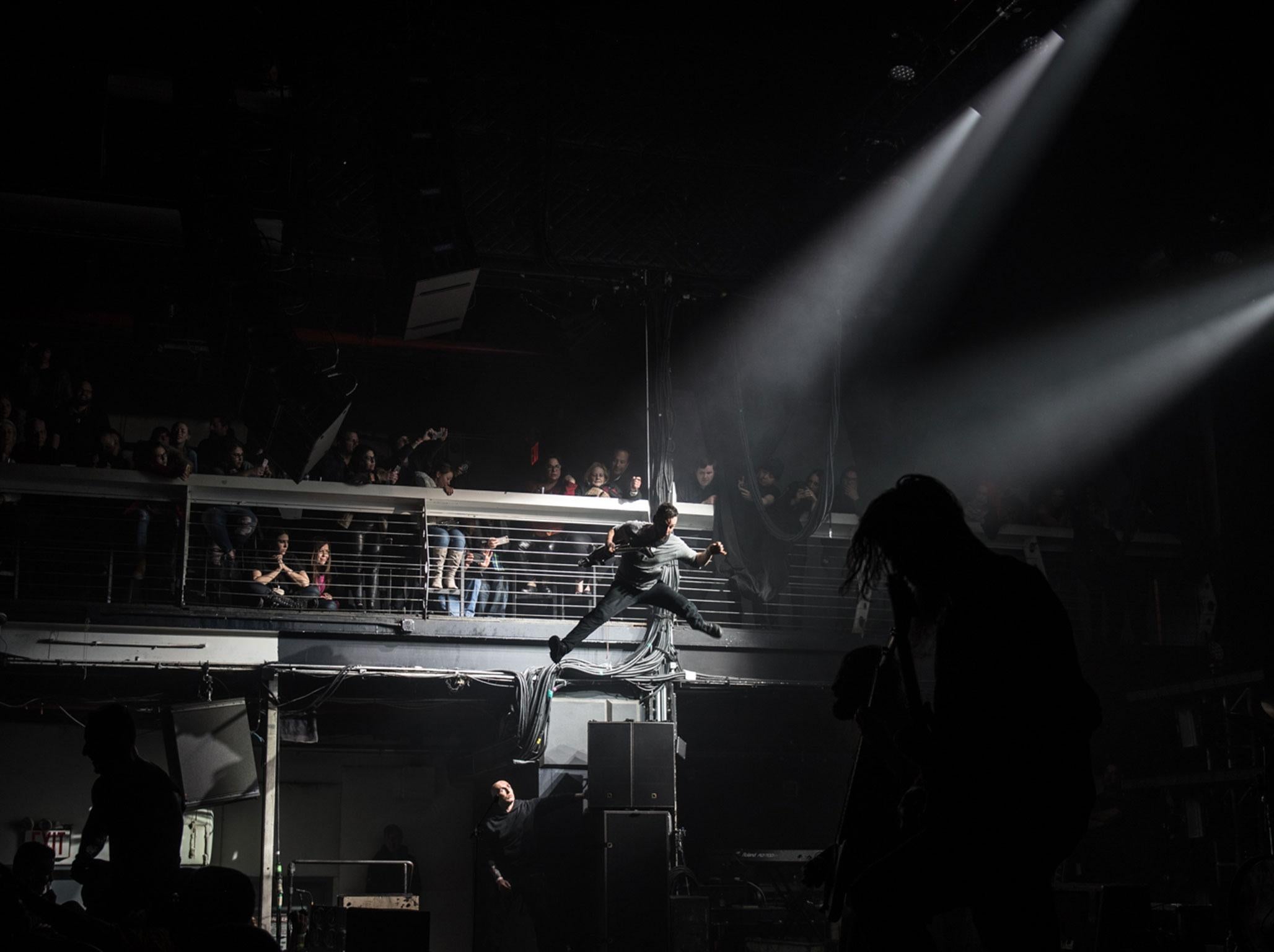
Code Orange’s amalgam of sinister samples, hardcore blast-beat bluster and groovy, sludge-infested riffs have garnered them a devoted following and a wave of unexpected hype. A nascent backlash is sadly inevitably brewing, perpetuated no doubt by the sheer amount of exposure and platitudes the Pittsburgh mob’s third album Forever has afforded them (including a highly coveted spot in our own Top 20 rock and metal albums of the year). It’s a common trend with bands that are suddenly exalted to such a lofty position, but you’d have to be stone deaf to not at least acknowledge that Code Orange are approaching hardcore from an entirely different angle to their peers.
Some find the stronger-than-all bravado and intimidation tactics off-putting and it’s easy to understand why that sort of patter can tire quickly. But to focus on that would be to miss the fact that Code Orange have written some of the most abrasive, brutal slabs of hardcore in recent memory, as proved this evening with renditions of “Kill The Creator”, “Forever” and the catastrophic “My World”. But the most exciting aspect of Code Orange’s career is the direction where they’re headed, as evidenced by the grunge-tinged-with-menace detonation of “Bleeding In The Blur”.
Just like Dillinger were around the time of 2004’s Miss Machine album, Code Orange are broadening out their sound and bringing in other elements that complement their singularly dark concoction. Hopefully, given time, their experimentation will prove as fruitful as Dillinger’s did, but whether it does or doesn’t, Code Orange are a band willing to put their head above the parapet and from whichever angle you view it, that is something to be applauded. More often than not, it’s the game-changers that provoke the most extreme reactions of love and hate in an audience and in that respect, Code Orange are no different. Whether they manage to scale the same lofty heights of the headliners remains to be seen, but with their current form, hunger and record, they have a better chance than any other at the moment of taking Dillinger’s crown and running with it.
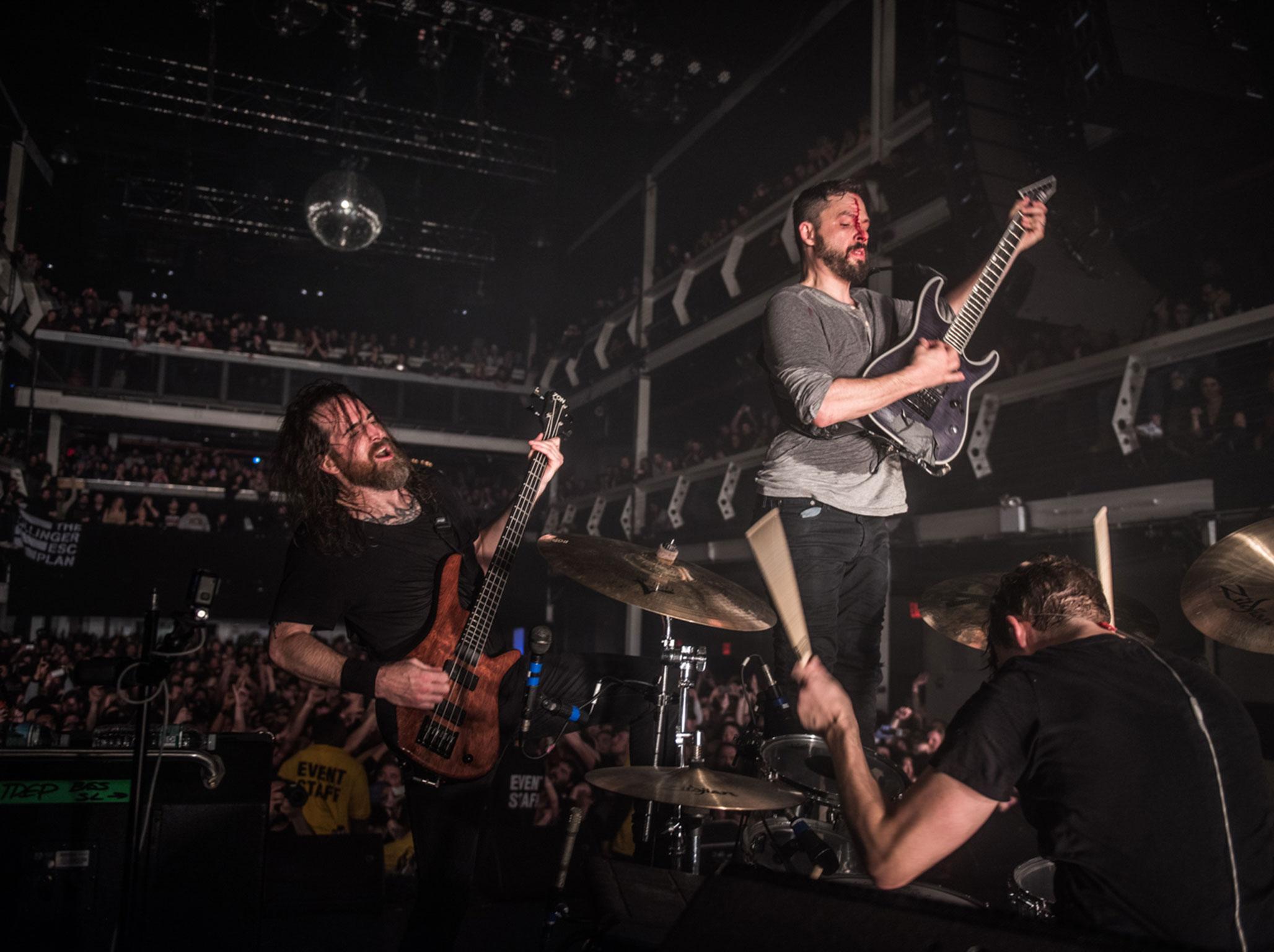
An electronic pulse and flashing lights usher in The Dillinger Escape Plan’s final show and the roar that erupts upon their entrance is seismic. If this evening hadn’t felt monumentally final enough up to this point, it is the crowds rabid response that awakens the notion that this really is it, the final time that anybody will get the opportunity to witness one of the most innovative and challenging bands in the world in their element. Before they play a solitary note, a room full of eyes are watering and cheeks are stained with tears.
Beginning with the never-played “Proceed With Caution”, the opening instrumental from their self-titled 1997 EP, is not only a fantastic nod to their origins but is also advice that could be well-heeded by the patrons of Terminal 5 this evening. From the off, the place is utter bedlam, with bodies flying in all directions, infinitesimal circle pits erupting and band members contorted into various twisted, gnarly shapes (sometimes onstage, often off it).
It’s difficult not to see a through-line of finality in Dillinger’s song choices this evening. Key phrases jump out and are given a whole new meaning in this context; the repeated clarion call of “Milk Lizard” – “This feels like never ending” – feels particularly pertinent sung en masse tonight, whilst the falsetto coda of “Dead As History” – “I’ll hold on to this forever/That is never long enough” – is bittersweet in extremis.

The setlist for all three nights is significantly different with a large focus on where Dillinger went for this final performance rather than where they began. “One of Us Is The Killer”, “Mouth of Ghosts” and another rare cut in the form of “Unretrofied”, show off what the band were capable of when incorporating melody and hooks into their frenetic and frenzied attack, whilst “Panasonic Youth”, “Baby’s First Coffin” and “Sandbox Magician” provide the more traditional technical savagery that Dillinger pioneered.
Four songs usually saved for set closers are played in succession to round things off, the scatty, schizophrenic “When I Lost My Bet”, the apocalypse-inducing “Sunshine The Werewolf”, the latter period career-defining “Farewell, Mona Lisa” and of course, the four minutes of sheer technical nirvana that provided most people’s introduction to the band’s unique brand of chaos, “43% Burnt”. During the latter there is a beautiful moment, when Dillinger guitarist and founding member Ben Weinman, standing on a monitor, drenched in sweat with arms aloft and bleeding from his temple, looks up to his right where his family are seated and smiles. Even if they don’t understand the significance of his achievements, they will be felt throughout heavy music for decades to come.
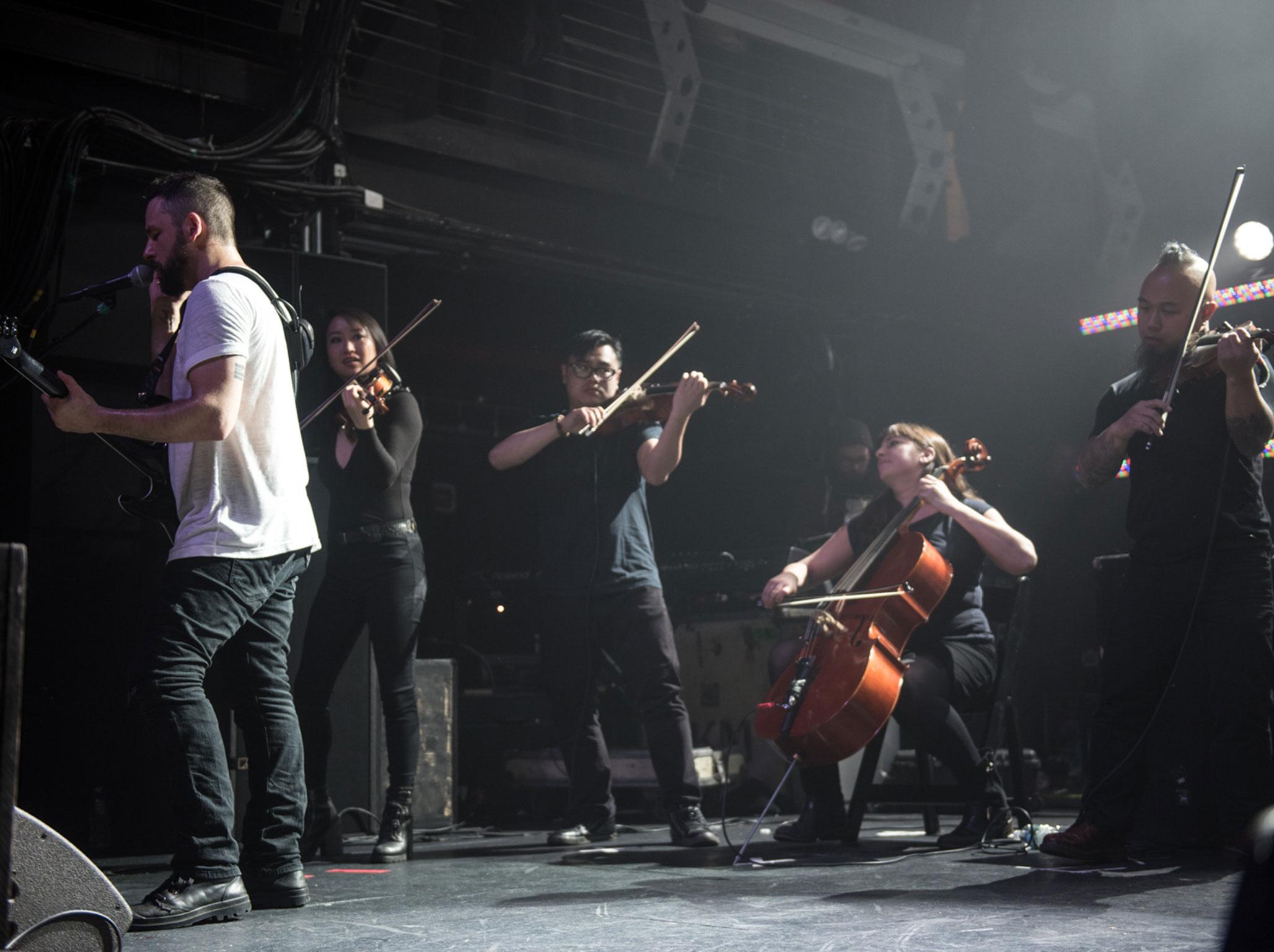
But the most exceptional moment is saved for the end; it becomes clear that this evening we’ll be treated to a second encore when New York-based string quartet seven)suns emerge and begin the opening strains of “Dissociation”, the final track from The Dillinger Escape Plan’s final album. Debuted live this evening, it’s a quiet, introspective end to the madness of the previous two decades, with all five members of the band fighting back tears alongside the majority of their audience. The Dillinger Escape Plan had a profound and lasting impact on heavy music throughout the last two decades, always innovators, never imitators. But their finale is quite possibly the most perfectly executed feat of their entire career.
Join our commenting forum
Join thought-provoking conversations, follow other Independent readers and see their replies
0Comments